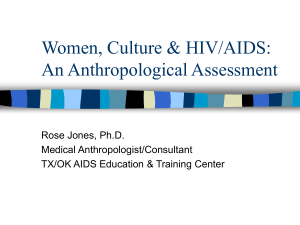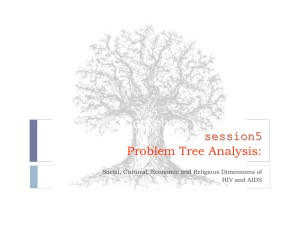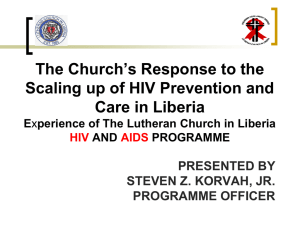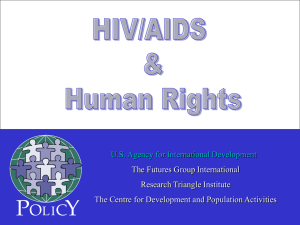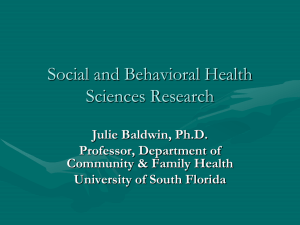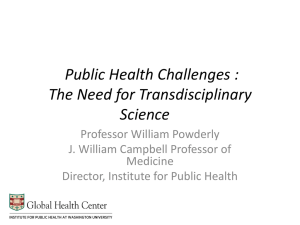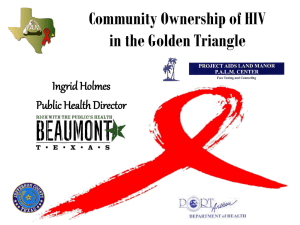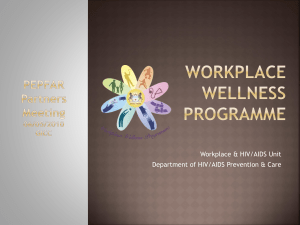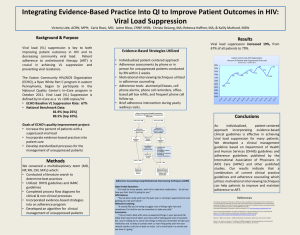Psychological interventions based on the Primary Care Model and
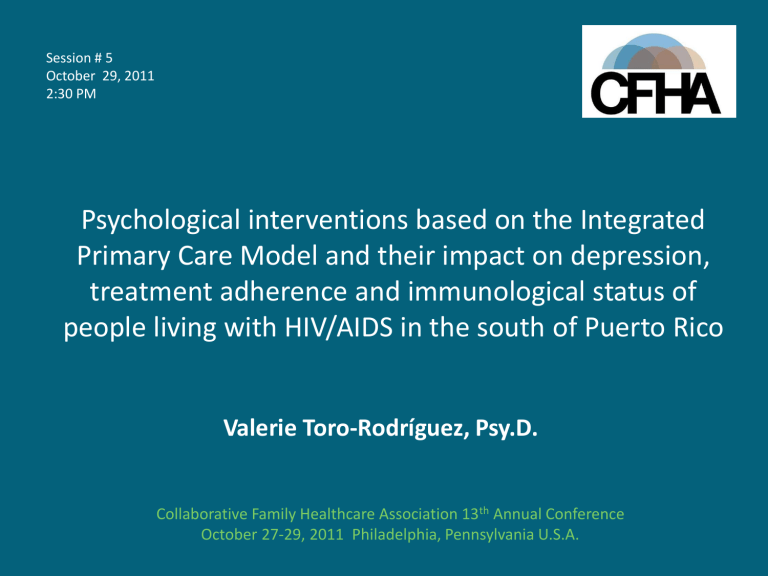
Session # 5
October 29, 2011
2:30 PM
Psychological interventions based on the Integrated
Primary Care Model and their impact on depression, treatment adherence and immunological status of people living with HIV/AIDS in the south of Puerto Rico
Valerie Toro-Rodríguez, Psy.D.
Collaborative Family Healthcare Association 13 th Annual Conference
October 27-29, 2011 Philadelphia, Pennsylvania U.S.A.
Faculty Disclosure
I have not had any relevant financial relationships during the past 12 months.
Need/Practice Gap & Supporting Resources
• Number of people diagnosed with HIV/AIDS is increasing
(UNAIDS, 2010).
• Higher life expectancy = more people dealing with multiple
stressors associated with HIV/AIDS (Safren, Radomsky, Otto y
Salomon, 2002).
• HIV/AIDS affects the physical and the emotional health (Fulk,
Kane, Phillips, Bopp y Hand, 2004).
• More than 40,000 people diagnosed with HIV/AIDS in Puerto
Rico (PR Health Department, 2011).
Objectives
• Discuss some of the psychological implications associated with HIV/AIDS.
• Describe some benefits associated with the integration of psychological interventions to the medical treatment for HIV/AIDS.
• Discuss the results of the project.
• Describe the implications that the results have for the psychology field.
Expected Outcome
Understand that psychological interventions based on the integrated primary care model can be applied with HIV/AIDS patients and can influence positively their emotional and physical health.
Psychological Influences of HIV/AIDS
Psychological Influences of
HIV/AIDS
• HIV/AIDS patients deal with:
• Anxiety symptoms
• Depression
• Stigma
• Complicated therapy regimens
• Loss of social support
(WHO, 2008)
Depression
• 23% of people living with HIV/AIDS in the US suffer from depression.
(WHO, 2008)
• The most prevalent mental health condition in the HIV/AIDS population. It influences:
– Treatment adherence
– Survival
(Rabkin, 2008)
Depression
• Depression has been associated with
– Physical symptoms related to HIV/AIDS (Zorrilla, McKay,
Luborsky y Schmidt, 1998)
– Faster disease progression (Gore-Felton et al., 2006)
– A weaker immune system and a higher mortality rate
(Howland et al., 2000; Ickovics et al.; Leserman et al.,
2002).
Stress
• High levels of psychological stress affect:
– Viral load (Ironson et al.,
2005)
– CD4 count (Ickovics et al.,
2001; Leserman et al.,
1999)
• Some of the stressors related to antiretroviral treatment are:
– Side effects
– Multiple daily doses
– Changes in the daily routine
– Food restrictions
(Kalichman, Ramachandran y
Ostrow, 1998; Moosa y
Jeenah, 2007)
Benefits of the Integration
• Dodds et al. (2004)
– Early detection on patients that need mental health services.
– Primary care physicians develop better understanding of the emotional health and the importance of integrated management.
– Better utilization of the mental health services.
– Stress reduction.
– Healthier behaviors.
Description of the Project
Purpose of the Study
• Examine the impact of psychological interventions based on the integrated primary care model on the levels of depression, treatment adherence, and immunological functioning (viral load/CD4 count) on a sample of people living with HIV/AIDS in the south part of Puerto Rico.
Hypotheses
• H1: A decrease on the level of depression will be observed after patient undergo psychological interventions, based on the integrated primary care model.
• H2: An increase in the level of adherence will be observed after patient undergo psychological interventions, based on the integrated primary care model.
Hypotheses
• H3: A decrease in the viral load will be observed after patient undergo psychological interventions, based on the integrated primary care model.
• H4: An increase in the CD4 count will be observed after patient undergo psychological interventions, based on the integrated primary care model.
Method
• Review of 182 records of patients living with HIV/AIDS that were treated by the Health Psychology Program of the Ponce School of
Medicine during from June 2009 to October 2010.
• The sample selection depended on the availability of the information on the records.
– 57 records
– 31.3% of people served during this period
• Collection of the information necessary to test the research hypotheses.
• Realization of the statistical analysis
Instruments
• PHQ-9
– Depression screening that has been validated for primary care population (Spitzer, Kroenke, & Williams, 1999)
– Administered at initial interview and after psychological treatment .
• Immunological Status Record
– Treatment adherence assessment instrument
– Developed by Health Psychology team
– Adherence = # pills prescribed / # of pills missed by the patient during the last month.
– Contains information of the viral load and the CD4 count.
Instruments
• Sociodemographic Data
– Age
– Gender
– Method of infection
– Time with the HIV/AIDS diagnosis
– Reason for referral
– Living place
– Antiretroviral treatment
Sample Profile
• Average age
– 45 years
• Method of infection
– 56.1% Heterosexual sexual contact
– 8.8% Homosexual sexual contact
– 8.8% Intravenous drug use
Sample Profile
12%
12%
Sample Profile
Time with the HIV/AIDS diagnosis
11%
25%
25%
18%
0 to 5
6 to 10
11 to 15
16 to 20
21 or more not available
Sample Profile
Results
Changes on the Levels of Depression
Variable n Initial Administration Final Administration
M SD M SD t df Sig
PHQ-9
Score p<.01*
31 16.23 (5.07) 10.29 (6.03) 6.25 30 .000*
Adherence to Antiretroviral Treatment
Variable n Initial
Administration
Final
Administration
M (SD) M (SD) t df Sig.
Adherence
Level
20 56.50 (20.84) 86.50 (16.55) -5.01 19 .000* p<.01*
Viral Load
Variable n Initial
Viral
Load
M (SD)
Final
M (SD) Z Sig.
38 54,278.38 (54,592.39) 2,205.13 (7,557.22) -2.48 .013*
<.05*
CD4 Count
Variable n Initial Final
M (SD) M (SD) Z Sig.
28 393.42
(290.99) 434.39 (298.74) -2.48 .082* CD4 count
>.05
Implications
• This findings suggest that the integrated primary care interventions could help to:
– Decrease the levels of depression
– Improve antiretroviral treatment adherence
– Delay the virus progression
In people living with HIV/AIDS .
Implications
• Psychological treatment should be accessible and available for people living with HIV/AIDS in Puerto Rico.
• It is recommended that psychologists integrate screenings for depression and treatment adherence in settings where HIV+ patients receive their medical treatment.
• Psychologists at Puerto Rico that are working with the population should be trained in the integrated primary care model.
Lets Review…
• What are some of the psychological implications of HIV/AIDS?
• Which are some of the benefits of the integration of psychological interventions in the HIV/AIDS medical treatment?
• How this information is important for the psychology field?
Session Evaluation
Please complete and return the evaluation form to the classroom monitor before leaving this session.
